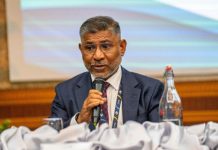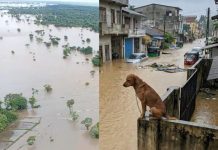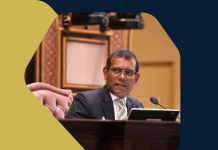The TCG Volkan (P-343), a 44-year-old Turkish warship that Turkey is giving to the Maldives for free. Alongside this donation, President Mohamed Muizzu is planning to buy missiles and has already purchased drones from Turkey. These deals sound like a boost for the Maldives’ security, but many people are asking: Why is Turkey being so generous? And what’s the real cost for the Maldives? With rumors of secret payments and political games, let’s break it down in simple terms to understand what’s happening.
What Is TCG Volkan?
The TCG Volkan is an old warship, built in 1981 for the Turkish Navy. It’s a fast attack craft, designed to move quickly and carry weapons like missiles and guns. It weighs 436 tons, has a crew of 45, and can travel 1,050 miles without stopping. But after more than 40 years, it’s not a modern ship anymore. Its engines use a lot of fuel, and fixing it costs money. In February 2024, Turkey stopped using it for battles and turned it into a training ship. Now, they’re giving it to the Maldives.According to news from Anadolu Agency, Turkey is fixing the ship and will send it to the Maldives between April and June 2025.
The big question is: Why is Turkey giving away a warship? There’s a saying, “There’s no free lunch,” meaning nothing comes without a catch. The Maldives needs ships to patrol its huge ocean territory, but an old ship like TCG Volkan might cost more to maintain than it’s worth.
So, what’s Turkey getting out of this?
One idea is that Turkey wants to sell more to the Maldives. Reports say Muizzu plans to buy 35 short-range surface-to-air missiles from Turkey for about 500 million Maldivian Rufiyaa, which is roughly $32.4 million. Each missile costs around $600,000, but some people think this price is too high. There’s also talk of another deal where Turkey offered a ship with payments spread over two years if Muizzu buys missiles. This makes it seem like the free ship is a way to convince the Maldives to spend big on other things.
Another reason could be politics. The Maldives is in a key spot in the Indian Ocean, and big countries like India and China want influence there. Turkey might see a chance to make friends with the Maldives and get a foothold in the region. By giving a ship and training, Turkey makes the Maldives depend on them for help and parts, which builds a long-term connection.
The Missile Deal: A Closer Look
The missile deal is raising a lot of questions. Sources say Muizzu’s government is buying these missiles without asking other companies for prices, using something called a “single source method.” This means they’re only talking to one Turkish company, which can lead to higher costs and less fairness. Some posts on X claim the government is paying too much for the missiles to hide money for Muizzu’s 2028 election campaign. These are serious accusations. The deal also seems rushed. A source said Muizzu met a Turkish person in Aarah, who offered a ship on easy payments if the Maldives bought missiles. The cabinet has reportedly approved this, but a group called the 241 Committee, which checks government spending, doesn’t know about it. This secrecy worries people who want the government to be open about how it spends money.
Drones and Kickbacks: A Pattern?
This isn’t the first big defense deal with Turkey. In 2023, the Maldives bought six Baykar TB2 drones for $37 million. These drones help patrol the ocean, but many think the price was too high—each drone might cost $6 million, while similar ones sell for $2-3 million. The deal was done through Baykar, a Turkish company run by Selçuk Bayraktar, who is married to President Erdoğan’s daughter. Some say Muizzu got a $7 million secret payment from this deal, and a man named Ismail Karaosmanoğlu got $2 million for helping arrange it.
Who Is Ismail Karaosmanoğlu?
Ismail Karaosmanoğlu is a key figure in this story. He’s a close friend of Muizzu and has ties to Erdoğan’s family. He runs a company called Modern Defense Solutions (MDS), started in 2017 to work in military and security businesses. Some say MDS was created to make money for Erdoğan’s family. Karaosmanoğlu set up Muizzu’s meeting with Erdoğan when Muizzu visited Turkey in November 2023. During that trip, Muizzu also visited defense companies, including Baykar, which led to the drone deal.
Karaosmanoğlu’s role raises concerns. If he’s helping with deals that involve high prices and possible secret payments, it suggests the deals might benefit a few people more than the Maldives as a whole. His connection to both leaders makes it look like personal friendships could be driving big decisions.
Money and Islands: Paying for It All
To pay for these deals, the Maldives is looking for creative ways to raise money. The government recently said it wants $15 million from investors for “national security projects.” In return, investors could get lagoons or islands under a plan called cross-subsidy. This means the government gives away land instead of paying cash upfront. While this could fund ships and missiles, it worries people who don’t want the Maldives’ beautiful nature sold off for military gear.
The timing of this plan, right when the missile and ship deals are happening, makes it seem like the government is scrambling for cash. If the deals are as expensive as critics say, the Maldives could end up with big debts, especially if the ship and missiles don’t work as hoped.
Why This Matters
These deals aren’t just about ships and weapons—they’re about trust and priorities. The Maldives faces real challenges, like rising sea levels and healthcare needs. Spending millions on missiles and drones might not be the best use of money if it leaves less for schools or hospitals. An old ship like TCG Volkan could also cost a lot to keep running, which could hurt the budget more than help security.
The secrecy is another problem. When the government hides details, like who it’s buying from or how much it’s paying, people lose faith. The claims about Muizzu and Karaosmanoğlu getting secret money make this worse. If true, it means leaders are putting themselves first, not the country.


















